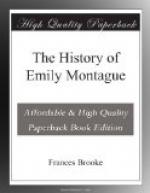Whether he sees it or not I cannot tell; I rather think he does, because he has been less here, and more guarded in his manner when here, than before this matrimonial affair was put an end to; which is natural enough on that supposition, because he knows the impertinence of Quebec, and is both prudent and delicate to a great degree.
He comes, however, and we are pretty good company, only a little more reserved on both sides; which is, in my opinion, a little symptomatic.
La! here’s papa come up to write at my bureau; I dare say, it’s only to pry into what I am about; but excuse me, my dear Sir, for that. Adieu! jusqu’au demain, ma tres chere.
Yours,
A.
Fermor.
LETTER 71.
To Miss Rivers, Clarges Street.
Quebec, Feb. 20.
Every hour, my Lucy, convinces me more clearly there is no happiness for me without this lovely woman; her turn of mind is so correspondent to my own, that we seem to have but one soul: the first moment I saw her the idea struck me that we had been friends in some pre-existent state, and were only renewing our acquaintance here; when she speaks, my heart vibrates to the sound, and owns every thought she expresses a native there.
The same dear affections, the same tender sensibility, the most precious gift of Heaven, inform our minds, and make us peculiarly capable of exquisite happiness or misery.
The passions, my Lucy, are common to all; but the affections, the lively sweet affections, the only sources of true pleasure, are the portion only of a chosen few.
Uncertain at present of the nature of her sentiments, I am determined to develop them clearly before I discover mine: if she loves as I do, even a perpetual exile here will be pleasing. The remotest wood in Canada with her would be no longer a desert wild; it would be the habitation of the Graces.
But I forget your letter, my dear girl; I am hurt beyond words at what you tell me of my mother; and would instantly return to England, did not my fondness for this charming woman detain me here: you are both too good in wishing to retire with me to the country; will your tenderness lead you a step farther, my Lucy? It would be too much to hope to see you here; and yet, if I marry Emily, it will be impossible for me to think of returning to England.
There is a man here whom I should prefer of all men I ever saw for you; but he is already attached to your friend Bell Fermor, who is very inattentive to her own happiness, if she refuses him: I am very happy in finding you think of Temple as I wish you should.
You are so very civil, Lucy, in regard to me, I am afraid of becoming vain from your praises.
Take care, my dear, you don’t spoil me by this excess of civility, for my only merit is that of not being a coxcomb.




